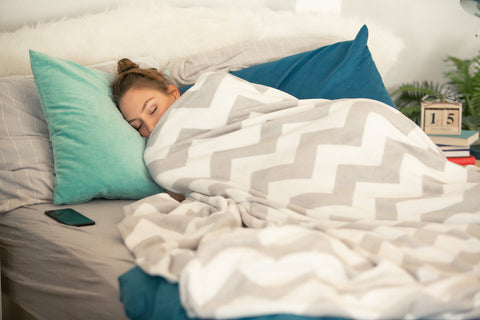Top 5 tips for falling asleep more quickly

Here at BedHut, we understand that falling asleep can be a source of pain and frustration for many people. Tossing and turning, lying awake for hours, and dreading the inevitable tiredness and fatigue the next day is something that everyone will experience at some point in their lives. If you experience this issue regularly, or just want to improve your sleep, read on for our top tips on falling asleep more quickly.
How long should it take to fall asleep?
The average sleeper nods off within 10 to 20 minutes of putting their head down. There are plenty of factors that may cause this to fluctuate, but on average, you should be aiming for a time between this range.
If you are regularly taking more than half an hour to fall asleep, there may be an underlying issue that needs to be addressed. After this amount of time awake in bed, studies show that the quality of your eventual sleep decreases dramatically, which can leave you feeling groggy and tired the next morning.
Why does it take me so long to fall asleep?
There is a plethora of reasons why you might not be sleeping as soon as you’d like, but here are the main reasons most people might experience.

Poor Sleep Hygiene
One of the main reasons for poor sleep is your night-time regime. In order to prepare your body for sleep, you must first allow it to understand that it is night-time.
In order to prepare yourself for a good night’s sleep, try these quick fixes:
- Avoid heart rate increasing exercise before bed, this allows your body to be fully relaxed before bed, and not full of adrenaline and energy.
- Avoid drinking caffeine before bed. It may feel like that nice warm cuppa is sending you off to sleep, but it might actually be what’s keeping you up at night. Caffeine increases your heart rate and energy levels and should ideally not be consumed within 6 hours of bedtime.
- Avoid screens before bed. Many people are guilty of watching videos, playing games, and reading e-books in bed until they feel tired. This stops your brain from realising that it’s time to sleep, as the bright light tricks it into thinking it’s still daytime. Try to avoid screens for up to an hour before going to bed.

Circadian Rhythm
If you’re struggling to go to bed or feel tired at the same time every night, it may be because your sleep schedule isn’t matching up with your circadian rhythm.
Your circadian rhythm is a kind of internal 24-hour clock, that dictates when you will feel tired, and when you’re most likely to get some sleep. If you spend ages lying in bed, not feeling tired, it may simply be a case of needing to go to bed later. Alternatively, if you feel tired in the evening but then when you go to bed hours later, you can’t quite nod off, an earlier bedtime may be best to suit your internal clock.
Insomnia
If neither of these things work for you, and you suspect you may be suffering from a sleep disorder such as insomnia, contact your GP and they will provide medical advice to suit your needs.
Our tips for falling asleep more quickly
If none of the above applies to you, or you just want to maximise your chances of a good night’s sleep, try these handy tips and you’ll be nodding off in no time!
Cool your room down
Your body temperature changes throughout the night, cooling down as you fall asleep and warming up as you wake.
In order to fall asleep in the first place, studies have shown that your body temperature must drop by a couple of degrees. This means that, if you room is too warm, your body may struggle to reach the state needed for sleep. Try keeping your bedroom between 15 and 20 degrees Celsius.

You could also try taking a warm shower before bed. As your body cools down afterwards, this may signal to your brain that it’s time to go to sleep.
Get on schedule
One of the main factors that affects your sleep is your circadian rhythm, and the best thing t you can do to support this internal clock is to maintain a consistent sleep schedule.
Try going to bed and waking up at the same time every day, regardless of whether or not you have the chance for an oh-so-tempting lie-in. This trains your brain to get sleepy around bedtime, and active when it’s time to get up.
With an inconsistent schedule, your brain never knows what time it might be sleeping that night, or what time it’s getting up, and so won’t be cooperative when you try to force it to fall asleep when it doesn’t want to. A consistent schedule is the best way to avoid this.

Invest in a quality mattress
Perhaps one of the most obvious solutions, but also one of the most commonly overlooked, your mattress may be having an impact on the quality and timeliness of your sleep.
It is recommended that sleepers change their mattresses every 6-8 years, as they lose support over time, leading them to become uncomfortable and difficult to sleep on.
Many sleepers are also unaware of what kind of mattress is right for them, as there are many types of sleepers and each one has a specific style of mattress built for them. For more information on how to find the perfect mattress for you and your sleeping type, check out our mattress buyers guide.
Expose your body to daylight
Light plays a large part in your circadian rhythm, serving as a handy indicator of when it’s daytime and night-time.
If you spend all day in a dimly or artificially lit room, with little exposure to sunlight, your brain is unable to make a distinction when it become night-time. This means that you may feel sleepy during the day and wide awake at night.
The solution is to expose your body to sunlight during the day, spending time outside in the sun and allowing more natural light into your room. This means that when night comes, there is a clear distinction in light levels, and your body knows it’s time for sleep.
This also applies to light at night. Allowing too much artificial light into your room at night might confuse your body’s internal clock. Avoid screens and blue light before bed and consider investing in some blackout curtains or blinds if streetlights are glaring through your bedroom window.

Try to avoid napping
As tempting as it may be, some studies have shown that midday naps may actually adversely affect your night-time sleep.
Long naps during the day, around 2 hours or more, can often leave sleepers feeling fatigued and groggy rather than refreshed. This is because, an hour or two into sleep, sleepers enter REM sleep, the deepest state of sleep. Once entering this state of sleep, any untimely interruptions, like an alarm or unwanted sunlight creeping in, can pull the sleeper out of this state, leaving them feeling disoriented and tired.
Short naps of around 20 to 30 minutes are acceptable however, as you don’t enter into this deep state of REM sleep, and instead simply refresh yourself for the rest of the day.
In order to keep naps form having an impact on your night-time sleep, try to avoid indulging in them up to 6 hours before bedtime.

Happy sleeping!
We hope these tips help you get to sleep in a more timely and less frustrating manner. Check out our tips for a good night’s sleep to improve the quality of your sleep or check out our range of comfortable and supportive mattresses to ensure a great night’s sleep every time!


